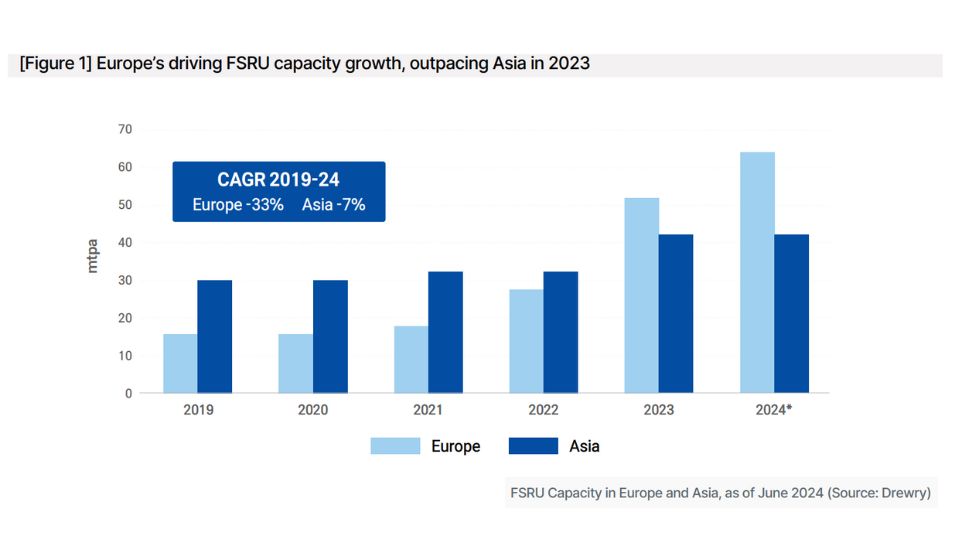
The rapid expansion of Floating Storage Regasification Units (FSRUs) across Europe and Asia is raising increasing concerns about its potential to undermine regional and global climate goals, according to a new report by Solutions for Our Climate (SFOC).
The report, titled "Floating Doubts: The Risks of FSRUs in Expanding Methane Gas" and published on Tuesday [September 3], warns that the growing reliance on FSRUs as a solution to energy security challenges is locking countries into long-term fossil fuel dependence.
This trend is particularly notable in Asia, where energy demand is surging, and countries like Bangladesh are turning to FSRUs to diversify energy sources and reduce reliance on traditional gas pipelines, according to a press release.
Bangladesh, in particular, faces a significant risk of LNG regasification overcapacity. Currently, the country has two FSRUs with a combined annual capacity of 7.6 million tonnes per annum (mtpa).

However, with plans for four additional LNG terminal projects that would add an extra 21 mtpa of capacity by 2030, Bangladesh is at risk of developing surplus infrastructure. This concern is underscored by the country’s declining LNG imports, which peaked at 5.06 mtpa in fiscal 2021-22 and dropped to 4.09 mtpa the following year, the report said.
A cyclone in May severely damaged an FSRU off the coast of Bangladesh, exposing the vulnerability of these units to extreme weather events—a risk likely to increase as climate change intensifies.
Operations at the facility were paused for over three months, with no definite restart date announced, casting doubt on the reliability of FSRUs for ensuring continuous energy supply.
Environmental concerns are another key focus of the report. SFOC's analysis suggests that the growing dependency on FSRUs could lock Bangladesh into long-term fossil fuel reliance, undermining global and regional climate goals.
The International Energy Agency's (IEA) net-zero scenario projects that global LNG demand will peak by 2030 and decline by over 56 per cent by 2040. This suggests that investments in FSRUs could soon lead to stranded assets as the world transitions away from fossil fuels.
LNG subsidies to domestic gas distribution companies have become an escalating financial strain for Bangladesh. Government subsidies for LNG imports have increased dramatically, from Tk 1,000 crore (approximately $92 million) in FY19 to Tk 2,812 crore ($260 million) in FY21.
The subsidy burden spiked further in FY 2021-22 due to the Russia-Ukraine war, with Tk 4,000 crore ($370 million) disbursed in just the first nine months. This increase in subsidies threatens to divert funds from critical development sectors.
According to a Centre for Policy Dialogue (CPD) analysis, for every one percentage point increase in energy subsidies as a share of GDP, public spending on health and education decreases by an average of 1.63 percentage points of GDP.
The report also highlights broader environmental concerns associated with FSRUs, including the potential for marine ecosystem disruption, coastal erosion, and increased methane emissions.
Methane, the primary component of natural gas, has a global warming potential 84 times that of carbon dioxide over a 20-year period. The report cites a 2023 study indicating that without stringent methane controls, the anticipated climate benefits of switching from coal to LNG are significantly reduced.
Globally, FSRUs have faced criticism from climate groups due to these environmental concerns. Notable examples include a 2023 legal complaint filed by a German environmental group against an FSRU in Wilhelmshaven and a Greenpeace protest in Croatia that labelled the "LNG Croatia" FSRU a "Climate Killer" in 2021.
Perceptions of LNG as a "cleaner" alternative fail to account for the additional climate risks posed by methane leakage and environmental degradation. A 2023 study revealed that without rigorous methane control, replacing coal with LNG fails to deliver the expected reduction in greenhouse gas emissions due to significant methane emissions.
Rachel Eunbi Shin, lead of the energy supply chain at SFOC, emphasised, "FSRUs are being marketed as a quick solution to energy security issues, but they are, in fact, a step backwards. By committing to FSRUs, countries risk being tied to fossil fuels for decades, thereby undermining climate targets and delaying the necessary shift to renewable energy."
The report calls for a reassessment of FSRU expansion plans in Asia, urging governments to redirect their focus towards renewable energy development.
The transition to renewables is essential not only for meeting climate targets but also for ensuring true energy security that is resilient to future challenges.